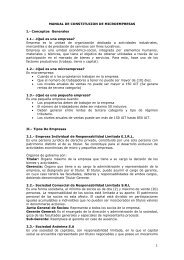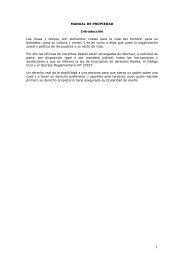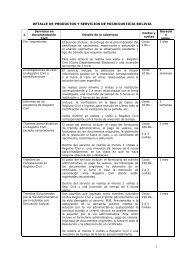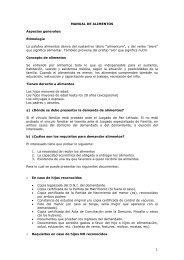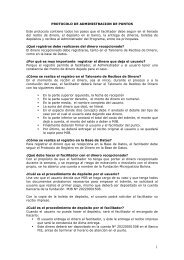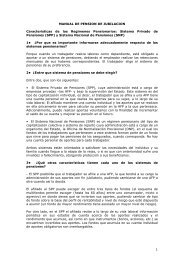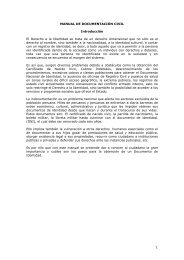ICISS report - International Coalition for the Responsibility to Protect
ICISS report - International Coalition for the Responsibility to Protect
ICISS report - International Coalition for the Responsibility to Protect
Create successful ePaper yourself
Turn your PDF publications into a flip-book with our unique Google optimized e-Paper software.
The <strong>Responsibility</strong> <strong>to</strong> <strong>Protect</strong> 58<br />
7.5 The main example of such a deployment was UNPREDEP in Macedonia, from 1992<br />
until its untimely withdrawal in 1999. While <strong>the</strong> essential purpose of this deployment was<br />
<strong>to</strong> deter any possible hostility from Yugoslavia, it has been argued – perhaps with <strong>to</strong>o much<br />
benefit of hindsight – that <strong>the</strong> presence of <strong>the</strong> <strong>for</strong>ce also had a stabilizing influence on <strong>the</strong><br />
fragile internal situation. The operational problems confronting any such deployment are<br />
essentially <strong>the</strong> same as those involved <strong>for</strong> a traditional UN peacekeeping operation.<br />
7.6 The second category of preventive operation is where military resources are deployed<br />
without an actual intervention on <strong>the</strong> terri<strong>to</strong>ry of <strong>the</strong> targeted state, and accordingly <strong>the</strong><br />
question of consent does not arise. Such operations may be intended as a show of <strong>for</strong>ce <strong>to</strong><br />
give added weight <strong>to</strong> diplomatic initiatives, or perhaps serve as instruments <strong>to</strong> moni<strong>to</strong>r or<br />
implement non-military en<strong>for</strong>cement actions such as sanctions and embargoes, including<br />
in humanitarian crisis situations. The rules of engagement <strong>for</strong> such operations will primarily<br />
be of a defensive nature, and only <strong>to</strong> a very limited degree, if at all, allow <strong>for</strong>cing an<br />
opponent <strong>to</strong> comply. Preventive military action in this sense can be important in providing<br />
a firewall <strong>to</strong> try <strong>to</strong> help keep a conflict in a neighbouring country from spreading. A robust<br />
and decisive deployment may help <strong>to</strong> deter trouble, but can also provide a rapid response<br />
capacity should trouble arise.<br />
7.7 If prevention in ei<strong>the</strong>r of <strong>the</strong>se categories fails al<strong>to</strong>ge<strong>the</strong>r, <strong>the</strong> preventive operation<br />
may need <strong>to</strong> be turned in<strong>to</strong> an intervention <strong>to</strong>ol. Such <strong>for</strong>ces should <strong>the</strong>re<strong>for</strong>e be deployed<br />
and equipped <strong>for</strong> preventive operations in such a way that <strong>the</strong>y could easily be designated<br />
as part of an intervention <strong>for</strong>ce.<br />
PLANNING FOR MILITARY INTERVENTION<br />
7.8 If a military intervention is <strong>to</strong> be contemplated, careful advance planning is a prerequisite<br />
<strong>for</strong> success. There are many challenges <strong>to</strong> be surmounted, including <strong>the</strong> need <strong>to</strong> build<br />
an effective political coalition, work out agreed objectives, provide a clear mandate, devise<br />
a common plan of operations, and marshal <strong>the</strong> necessary resources. Especially important <strong>to</strong><br />
bear in mind is that <strong>the</strong> intervention phase is only one element in a broader political ef<strong>for</strong>t,<br />
and it must operate in harmony with <strong>the</strong>se broader objectives. The military intervention<br />
phase will necessarily be preceded by preventive actions which may <strong>the</strong>mselves include<br />
military measures such as sanctions or embargo en<strong>for</strong>cement, preventive deployments, or<br />
no-fly zones. The military intervention phase will likely be followed by post-conflict<br />
operations – discussed fur<strong>the</strong>r below – which in most cases will include <strong>the</strong> deployment of<br />
peacekeeping <strong>for</strong>ces <strong>for</strong> often substantial periods of time. The operational concept <strong>for</strong> an<br />
operation <strong>to</strong> protect needs <strong>the</strong>re<strong>for</strong>e <strong>to</strong> provide a smooth transition from pre-intervention<br />
ef<strong>for</strong>ts <strong>to</strong> post-intervention activities.<br />
<strong>Coalition</strong> Building<br />
7.9 Most interventions have involved in <strong>the</strong> past, and are likely <strong>to</strong> in <strong>the</strong> future, multinational<br />
coalition operations. The cohesion of an intervening coalition – politically and<br />
militarily – is critical <strong>to</strong> <strong>the</strong> prospects <strong>for</strong> success, and <strong>the</strong> fragility of <strong>the</strong> intervening<br />
coalition has thus been one of <strong>the</strong> most vulnerable aspects of past interventions. It has<br />
been observed that coalition operations will necessarily be characterized by gradualism and<br />
possibly delays in striking sensitive targets, and that <strong>the</strong>se are lasting military disadvantages<br />
of coalition operations that are only partly compensated by <strong>the</strong> stronger political impact of<br />
such operations in comparison with those of a single country. Spoilers have been ready <strong>to</strong><br />
target <strong>the</strong> unity of <strong>the</strong> coalition directly in order <strong>to</strong> neutralize <strong>the</strong> international presence or<br />
cause its withdrawal.



